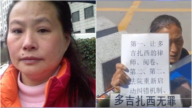【新唐人2012年1月28日讯】2012年刚过去不到一个月,大陆四川藏区已陆续发生多起军警暴力镇压藏民的事件,传出至少有12藏民死亡。有网友爆料,中央政治局常委、政法委书记周永康26号在甘孜康定,亲自指挥对藏胞的镇压。而人权组织“人权观察”近日发布的人权报告, 批评中共在藏区的人权压制,也引起官媒激烈反弹。
据报导,四川甘孜已经被当局封锁,网路和电话被切断。同时,当局向当地派驻大批警力,民众被限制自由出行。众多网友在通往藏区的路上看到大量武警车队、军车、装甲车、防暴车等,成都、德阳、绵阳的武警、特警都出动支援。
《法新社》记者的车辆在离炉霍三百公里的路上被警方拦截。而离炉霍六百公里的成都藏区,警方也加强了戒备,三步一岗,五部一哨,《法新社》记者一到藏区就立即被十多名警察围住,并被告知禁止拍照,禁止采访。
另外,拉萨网友报料,拉萨接近戒严,军队在布达拉宫门口集结。藏胞被警告,房顶若不插中共国旗要罚款600元。
与此同时,总部位于美国纽约的非政府组织“人权观察”,1月22号发表了审查全球人权状况的《全球年度报告(2012年)》。照例,它对包括中国在内的90多个国家和地区的人权状况进行了分析。
而中共喉舌《人民日报》26号立即跟进反驳。
《人民日报》驳斥美国“人权观察”组织是“有选择的开展工作,采取双重标准,缺乏政治中立,而且用人失察,方法有失严谨。”等。并且要求这个组织“对自己也应该有一个清楚的观察”。
武汉《中国人权观察》通讯创办人秦永敏向《新唐人》表示,“人权观察”的年度报告内容与《人民日报》谈“人权观察”的情况是两件事,不应该混在一起。
《中国人权观察》通讯创办人秦永敏:“关于人权观察或其他NGO是不是存在这样一些问题,这是两码事情,和人权组织他们批评别人的错误、指出别人的问题,是两码事情。那么对人权组织本身存在的问题,我们当然…社会舆论也应该进行监督和批评。《人民日报》作为一个政府机构,去批评美国的人权组织,它是不是也像美国的人权组织一样,批评自己的政府呢?”
另外,“四川大学”西部开发研究院教授杨明洪,也撰文反驳“人权观察”的报告。《报告》指责中共政权把所有牧民和游牧民迁至他处的作法违反人权,而杨明洪反驳说,西藏当局将当地80%以上的农牧民迁入固定的住房,是所谓“改善农牧民群众居住条件”。
出版历史专著《1959:拉萨》的美国华裔学者李江琳,从2004年开始致力于西藏问题研究。她表示,西藏牧民被中共的“安居工程”定居下来之后,失去了自己的生活方式,她怀疑有多少藏民是自愿“被安居”的?
西藏问题专家李江琳:“藏人也告诉我,离开了草原、离开了他的神山、离开了他的圣湖,他就失去了他的灵魂,这是一个很悲哀的事情。但是对这些牧民的生计应该怎么办…可是我也不认为,强行让牧民定居之后,定居在一个他们并不想要去的地方,这并不是一个办法。”
秦永敏也表示,中共强奸了西藏的传统文化。
秦永敏:“当局还经常对他们的藏族人民,包括那些喇嘛们搞政治学习,对他们进行洗脑,这样的话,他们就会觉得,自己原有的文化传统不仅被中断了,而且被强奸了,在这种情况下,他会感到幸福?还是会感到痛苦呢? ”
秦永敏认为,人权组织是社会的良心,如果没有他们,很多国家社会的问题就没办法发现。他说,人权组织是社会问题的X光机。
新唐人记者常春、周平、孙宁采访报导。
Deterioration in Sichuan Tibetan Human Rights
Less than a month into 2012, and incidents of violent police
suppression of Tibetans have been reported in Sichuan.
The incidents have caused at least 12 death.
A netizen reports that, on Jan 26, Politburo Standing
Committee member Zhou Yongkang personally led the persecution of Tibetans in Garzê.
At the same time, CCP media People’s Daily wrote articles
to refute reports by Human Rights Watch.
According to reports, the Garzê region in Sichuan has
already been blockaded by the regime.
Internet and phone lines have all been cut off.
At the same time, the regime sent large number of police
to restrict citizens from traveling.
Lot’s of netizens reported seeing large number of police
cars, military cars, armored vehicles and anti-riot vehicles.
Armed police and special police from Chengdu, Deyang
and Mianyang were also sent.
An AFP reporter’s car was intercepted on a highway 300 km
from Luhuo.
In Chengdu Tibetan region 600km from Luhuo, police also
increased security levels, with everywhere full of police posts.
An AFP reporter in the Tibetan region was surrounded by
over police.
They were told photography and interviews are prohibited.
In addition, a Lhasa netizen wrote that Lhasa is almost near
martial law; military is assembled in front of Potala Palace.
Tibetans were warned, those without Chinese flag on their
roof will be fined 600 yuan.
At the same time, Human Rights Watch (HRW) in New York
published it’s World Report 2012 on Jan 22.
It is a review of human rights around the world.
The report analyzed human rights conditions in over 90
countries, including mainland China.
However, the Chinese regime’s media People’s Daily
refuted the Human Rights’ Watch report on Jan 26.
The People’s Daily accused Human Rights Watch of being
an organization that, “conducts selectively work.
It uses double standards, lacks political neutrality, lacks
personnel oversight, and uses erroneous methods.”
It furthers that, “(Human Rights Watch) should get a clear
watch over itself.”
The founder of Chinese Human Rights Watch, Qin Yongmin
from Wuhan, spoke to NTD.
The Human Rights Watch annual report, and those accusing
Human Rights Watch are separate issues. These issues shouldn’t be mixed.
Qin Yongmin, “Regarding whether Human Rights Watch
and other NGOs have internal issues, this is separate.
It’s different from these organizations pointing out issues.
Regarding internal issues of the human rights organization,
we…society should supervise and criticize.
The People’s Daily is a government entity criticizing an
American human rights organization.
But does it criticize it’s own government like an American
human rights organizations?”
Yang Minghong, Sichuan University Professor at Western
Development Research Institute also refuted the HRW report.
Human Rights’s Watch criticized that the Chinese regime
forcing Tibetans to relocate is violating human rights.
Yang claims that relocating over 80% of Tibetans into stable
living conditions, is “improving living conditions of herders.”
He wrote, “how can the Human Rights Watch accuse the
welcomed ‘stable living project’ as violating human rights?”
Li Jianglin, a Chinese-American scholar and author of
“1959 Lhasa” has studied the Tibet issue since 2004.
She expressed, Tibetan herders lost their way of living after
being relocated to a fixed house.
How many Tibetans would choose that?
Li Jianglin, “Tibetans told me, leaving the grassland, their
sacred mountain, their holy lake, they lost their spirit.
This is a very sad thing.
Regarding their livelihood, I think forcing them to relocate
to the place they don’t want to be, that’s not a solution.“
Qin Yongmin expressed, the Chinese regime ruined Tibet’s
traditional culture.
Qin Yongmin, “The regime frequently force the Tibetan
people, those monks to study politics, to brainwash them.
This makes them feel that their traditional culture is not only
cut off, but has been raped.
In such conditions, would they feel happy? or extremely
painful?”
Qin Yongmin believes, human rights organizations are the
conscience of society.
Without them, many national and social problems can not
be discovered.
Human rights organizations are like X-Ray machines
for social conflicts.
NTD Reporters Chang Chun, Zhou Ping and Sun Ning




















